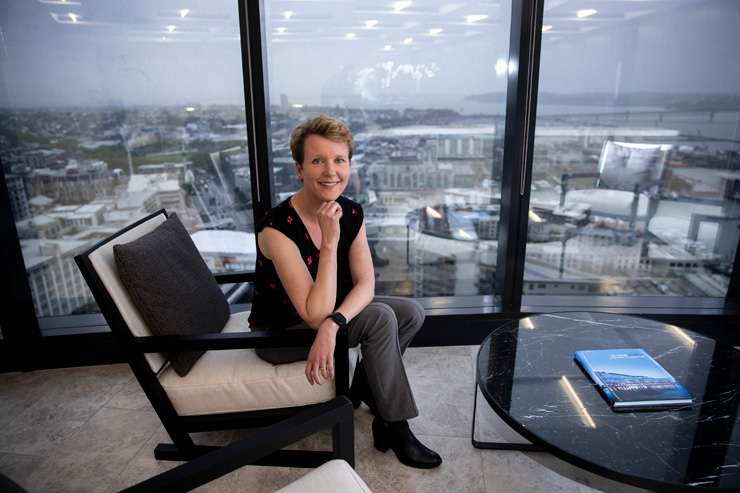Inflation is “sticky” and proving difficult to get on top of while house prices could rise faster than many expect, bank economists have told OneRoof, offering a mixed bag for both buyers and sellers.
Last week’s CPI figures showed the annual rate of inflation had fallen to 6% in the second quarter of this year, just below the Reserve Bank of New Zealand’s forecast but above bank economists’ expectations.
ASB chief economist Nick Tuffley says the ASB thinks the Reserve Bank has done enough to keep the Official Cash Rate of 5.5% on hold, but that doesn’t mean cuts are near.
“We think the Reserve Bank will be on hold until May next year so that will be pretty much a year of holding the cash rate at this high level.”
Start your property search
However, the risk of the OCR being raised again has also edged up because of stubborn underlying measures of inflation.
“That's something the Reserve Bank will be wary of and it will be looking pretty hard at the labour market data that's coming out on August 2.”
But Tuffley says the Reserve Bank can afford to sit and wait for the lagged impact of higher interest rates to filter through to the people who still have mortgages on relatively low fixed interest rates but who will have to refix at higher rates over the next six months.
“From a squeeze on homeowners’ ability to keep spending there’s more squeeze that’s still collectively coming on, even though mortgage rates are at or near their peak.”
As far as house prices go, the leading indicators are showing the market is starting to look up from the low and the ASB expects prices will gradually start to gain momentum, although it will likely be next year before they pick up more noticeably.
The current market is still a buyers’ one but Tuffley says the country is probably at that “absolute sweet spot” where prices are at their low and there’s still a little bit of stock on the market, so there is potential for competition to start to heat up.
“From a seller’s point of view, it’s probably a case of perhaps there's no rush unless you absolutely need to if prices are likely to be edging up.”
Westpac thinks the Reserve Bank will need to raise the OCR again, reporting that while inflation has slowed from the “eye-watering” rates of over 7% seen last year, this does not mean inflation is actually low.
Read more:
- Tony Alexander: Traffic jams outside open homes can mean only one thing
- Desperate buyers racing against the clock before banks pull their funding
- Overseas buyer picks up abandoned, 'barely standing' shop for $20,000
The bank thinks the OCR could go higher in the coming months and that interest rate cuts could be some time away, saying for homeowners there is value in fixing mortgages for terms as long as two years because it would provide some certainty around the size of repayments.
The bank’s chief economist, Kelly Eckhold, told OneRoof that might be an option particularly for people concerned about short-term cash flow, although he says the bank’s projections for the OCR beyond around 18 months or two years could suggest lower interest rates would be available at that time.
Eckhold says ongoing increases in house prices will likely rise broadly in line with the Consumer Price Index over the next couple of years, however, he also says Westpac is currently reviewing its projections.
House price appreciation could happen faster given the strength of net migration and a sense among first-home buyers, who have dominated the market of late, that the peak in interest rates is close.
“These are people that perhaps have been sitting there for the last couple of years looking at buying a house but have been unwilling to do so because they thought that prices would go down and also interest rates were going up.
“Now on both counts there's probably greater confidence amongst those people that there aren’t going to be further price declines, and also that interest rates are getting pretty close to where they are ultimately going to end up.”
ANZ reports there is some evidence to suggest inflation could be normalising above the Reserve Bank’s target rate of 1-3% and points to “sticky” inflation risks.

ANZ chief economist Sharon Zollner: “You should never underestimate the ability of the housing market to do what you don't expect it to do.” Photo / Dean Purcell
The bank’s chief economist, Sharon Zollner, says house prices are clearly rising again despite the Reserve Bank saying in May that they would fall until the end of the year.
But since the Reserve Bank called a pause on rate hikes there had been weaker GDP but stronger non-tradeable inflation and stronger house prices, she says.
The next big piece of the puzzle is the unemployment data out next month which could have the final say on how hawkish or dovish the Reserve Bank sounds in its next monetary policy statement.
Zollner says if the Reserve Bank sticks to its view that unemployment is going to rise quickly it will not worry too much about a bump in house prices, and she says the ANZ’s view is house prices will run out of steam fairly quickly.
Last month saw a number of factors combine, including it being the first full month since the Reserve Bank called a pause on rate hikes, but also the LVR tweaks kicked in making it a little bit easier for owner-occupiers, and it was also the first month CCCFA easing kicked in meaning banks not having to take such rigid account of people’s discretionary spending.
“They’ve all happened at the same time so in that regard it was not surprising to see the market getting a bit of a lift but we're forecasting house prices to only rise 3% in the second half of the year, which is only just above what we’re expecting inflation to do, so moving almost sideways in real terms.”
ANZ is forecasting a mild recession and rising unemployment so it would be odd for house prices to start going gangbusters in that environment, Zollner says, although anything is possible.
“Certainly, I have learned in 25 years of economic forecasting that you should never underestimate the ability of the housing market to do what you don’t expect it to do.”
Kiwibank’s weekly report says inflation rates are moving in the right direction, albeit slowly, and that it does not believe further tightening from the Reserve Bank is needed.
“Previous rate hikes are still working through the economy. However, the persistence of domestic pressures will force the RBNZ to keep rates restrictive.”

Kiwibank chief economist Jarrod Kerr: "Households are feeling the full force of all these interest rate rises." Photo / Fiona Goodall
Kiwibank’s chief economist Jarrod Kerr says the Reserve Bank has done more than enough to slow the economy and is picking the next move will be to cut the OCR and that could come as early as February next year.
“Even if it’s later on interest rates look like they’re peaking around these levels and hopefully this time next year we will see mortgage rates significantly lower than where they are today.”
A technical recession was already reported this year but Kiwibank expects to see a recession in the second half of this year.
“So pretty much from now. Households are feeling the full force of all these interest rate rises over the last 18 months and that’s really slowing things down so I think the Reserve Bank has done enough, 5.5% is the peak.”
Mortgage rates are still having an impact on the housing market with 40% of mortgages rolling from lower to higher rates by year end, which is a large amount, but there is good news as signs of life are emerging.
“I think we’re going to see quite a busy spring and summer. I think sentiment is becoming more positive, we're hearing more positive things from our frontline staff, there's a little bit more activity out there.”
House prices look to have bottomed out and there will likely be gains in house prices next year, due in part to a surge in migration which will increase to 100,000 in the next month or two.
People are not expecting house prices to fall further and it looks like the correction has largely played out.
“These people either take on rentals or they go out and buy but either way they are adding demand to the housing market so that’s providing some support in terms of the supply demand dynamic.”
Explore the latest mortgage rates with our interactive. Use the search field to find out the best deals available today.

















































































